撰文:Vitalik Buterin
編譯:深潮TechFlow
導讀:
三十而立。
今天是 Vitalik 的 30 歲生日,他也在這個重要的節點上,刊登了人生一篇名為《我童年的終結》的長文。
縱觀全文,Vitalik對以太坊的技術、加密世界的現狀、俄烏戰爭、生存與死亡、成長和經驗等消防主題表達了自己的感悟,同時他也直言:
加密世界裡的核心人物,Vitalik過去的時間裡走遍世界各地作為,以數位遊民的方式實踐著自己的技術理念,同時也面對世界各地的不同文化時,出現了更多的感悟與責任心。
這篇長文可以說是 Vitalik 站在 30 歲節點時,對個人經驗和整個加密世界的綜合性回顧與展望,內容一次豐富且情感真實。
深潮TechFlow對全文進行了編譯,分享給各位讀者。
在過去的兩年裡,我印象最深刻的一次是在黑客馬拉鬆上演講,參觀黑客之家,在黑山做Zuzalu,看到比我年輕整整十歲的人在各個項目中擔任領導角色,作為組織者或開發人員:加密審計,以太坊第2層擴展,合成生物學等等。Zuzalu核心組織團隊的迷因(MEME)是21歲的Nicole Sun之一,一年前,她邀請我參觀韓國的黑客之家:大約有30人的聚會,我記得這是我第一次成為房間裡最長的人。
當我和現在的駭客之家居民一樣大的時候,我記得很多人都稱讚我是像祖克柏這樣改變世界的、強大的、年輕的神童之一。

022年8月,通往首爾黑客之家的路徑。應該是因為我無法辨別我進入哪所房子,我正在與組織者溝通以獲取這些信息。當然,這所房子根本就不是這條路,但在它右邊大約二十米處有一個更明顯的眼睛的地方
1
延長壽命的支持者(意思是,進行醫學研究以確保人類可以真正活幾千年或幾百萬年),人們經常問我:生命的意義不是與它是有限的這一事實密切相關嗎? :你只有一部分,所以你必須享受它?
從歷史上看,我的直覺是駁斥這個想法的:雖然從心理學的角度來看,如果事物是有限的或稀缺的,我們往往會更重視它們,但認為長期存在的恩怨可能如此嚴重,以致比字面不再存在更糟糕,這簡直是荒謬的。另外,我有時會想,即使永生被證明是那麼糟糕,我們總是可以通過簡單地選擇來進行更多的戰爭來同時我們的“興奮」 」並降低我們的壽命。今天,我們中間的非反社會者拒絕這種選擇,這一事實強烈地向我表明,一旦它成為一種實際的選擇,我們基因就會拒絕它,因為它在生物死亡中和痛苦方面也是如此。
然而,隨著年齡的增長,我意識到我根本不需要討論這些。
無論我們的生命作為一個整體是有限的還是無限的,我們生命中的一切美好事物都是有限的。你以為是永恆的友誼,卻慢慢地消失在時間的迷霧中。你的性格可以在10年徹底改變。城市可以改變,無論好壞。你可以完全搬到一個新的城市,並重新開始從頭開始熟悉物理環境的過程。政治意向是有限的:你可能會圍繞你對最高邊緣階級和公共醫療保健的觀點建立了完整的身份,十年後,一旦人們似乎完全不再關心這些話題,轉而把所有時間花在談論“覺醒”、“青銅時代心態”和“e/acc”上。 ”上,你就會感到完全迷失。
(i)我正在尋找的東西是不可能的,(ii)在實踐中確定存在缺陷的系統成功與否的最重要指標(往往是參與者子群體之間的協調程度,但也經常包括我們將其簡化為“文化”的其他因素)是我甚至未曾建模的指標。
以前,數學是我身分認同的主要部分:我在高中時大量參與數學競賽,在我進入加密貨幣領域後不久,我開始在以太坊、比特幣和其他地方做大量的編碼,我對每一個新的密碼學協議都感到興奮,在我看來,經濟學也是更廣泛的世界觀的一部分:它是理解和弄清楚如何改善社會世界的數學工具。所有部件都已經組合在一起。
現在,這些碎片組合在一起的次數減少了。我仍然使用來分析社會機制,儘管目標更多時候是提出粗略的第一次猜測,即什麼可能有效並減少最壞情況的行為(在現實世界中)中,這通常是由機器人而不是人類完成的),而不是解釋一般情況下的行為。現在,我更多的寫作和思考,支持即使我十年前支持的那種理想,也經常使用非常不同的論點。
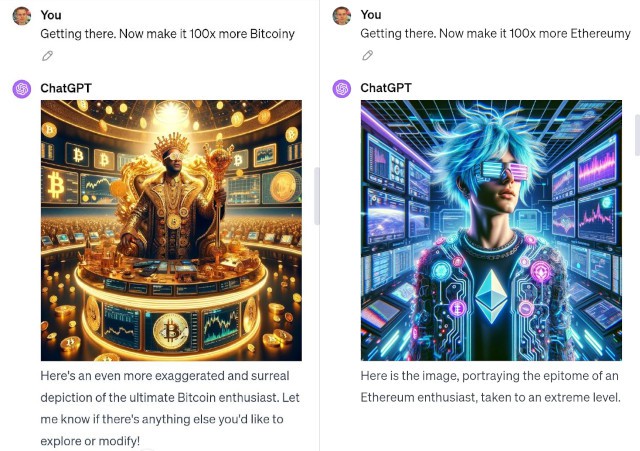
現代人工智慧讓我著迷的一件事是,它讓我們在數學和哲學上以不同的方式參與指導人類互動隱藏的變數:人工智慧可以使「聲音」易讀
所有這些死亡、出生和重生,無論是思想或人的集合,都是有限的方式。這些死亡和出生將繼續發生在我們生活的一個世紀、一千年或與主序星生命相同的世界中。如果你覺得生命沒有足夠的有限性、死亡和重生,你就有必要引發戰爭來增加更多:你也可以做出和我一樣的選擇,成為一個數位遊牧者。
2
「馬裡烏波爾的畢業生正在倒下」。(譯者註:直譯為火砲在馬裡烏波爾城市降下,應暗指俄烏戰爭)
我仍然記得昨天2022年2月23日晚上7點20分,我在丹佛的酒店房間裡焦急地看著電腦螢幕。在過去的兩個小時裡,我一直在同步滾動Twitter上獲取更新,並反复聯繫我的父親,他和我都有同樣的想法和恐懼,直到他給我最終做出決定性的回應。我發布了一條推文,要求明確表達了我對這個問題的表述,我一直專注。那天晚上我熬夜了。
隔天早上,我起床時看到烏克蘭政府的推特帳號拼命要求以加密貨幣啟動。俄羅斯政府本身,利用每個人的困惑和絕望來偷一些錢。我的「安全心態」本能引發了上風,我立即開始發推文警告人們要小心,同時透過我的網路尋找可以或確認否認ETH位址是否是真實的人。一個小時後,我確信它實際上是真實的,我公開轉達了我的結論。大約一個小時後,一位家人給我發了一條訊息,指出我已經做了什麼,為了我的安全,我最好不要再回俄羅斯了。
Eight months later, I see the crypto world going through a very different kind of turmoil: the public demise of Sam Bankman-Fried and FTX. At the time, someone posted a long list of "crypto protagonists" on Twitter, showing which ones had fallen and which ones were still intact. This list has a high casualty rate:
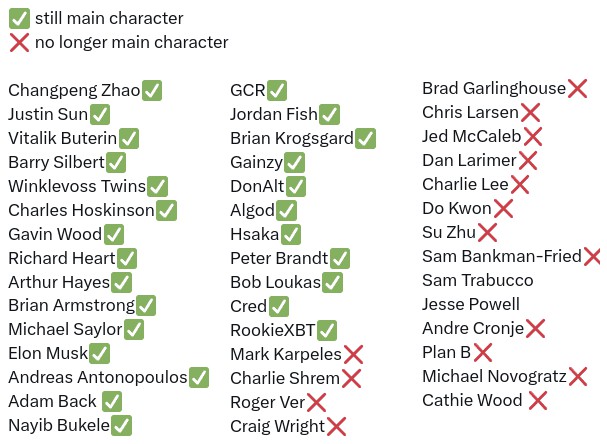
The SBF situation is not unique: it is a mix of MtGox and several previous major upheavals that have engulfed the crypto world. But this was the moment when I realized, all at once, that most of the people I had viewed as guiding lights in the crypto world, that I had felt comfortable following since 2014, were no longer there.
People who look at me from a distance often think of me as a high-motivation person, presumably because that's what you'd expect from a "protagonist" or "project founder" who is a "college dropout." However, in reality, I am anything but. The virtue I valued as a child was not the virtue of being creative when starting a unique new project, or showing courage when it was needed, but rather the virtue of showing up on time, doing homework, and getting a 99% average. The virtues of a good student.
My decision to drop out of school was not a courageous step of faith. It started in early 2013 when I decided to take a paid internship over the summer to work for Ripple. When US visa complications prevented this, I instead spent the summer working with my Bitcoin Magazine boss and friend Mihai Alisie in Spain. At the end of August I decided I needed to spend more time exploring the crypto world, so I extended my vacation to 12 months. It wasn’t until January 2014, when I saw hundreds of people cheering for my talk introducing Ethereum at BTC Miami, that I finally realized I had chosen to leave college for good. Most of my decisions in Ethereum involve responding to pressure and demands from others. When I met Vladimir Putin in 2017, I didn’t try to arrange a meeting; instead, someone else suggested it and I pretty much said “sure.”
Now, five years later, I finally realize that: (i) I had been complicit in legitimizing a genocidal dictator, and (ii) I no longer have the luxury of sitting back and letting those mysterious people in the crypto space The "other" has the luxury of taking charge.
Both incidents, although they differed in the type and scale of their tragedies, burned similar lessons into my mind: I actually have responsibilities in this world, and I need to be intentional about how I Mode of operation. Doing nothing, or living on autopilot and allowing yourself to simply become part of someone else's plan, is not an automatically safe or even blameless course of action.
I am one of the mysterious others who play this role. If I don't and the crypto space either stagnates or is dominated by opportunistic money grabbers, then I have only myself to blame. So I decided to be cautious about accepting other people's plans and be more vocal about the plans I made myself: have less ill-conceived meetings with random powerful people who were only interested in me as a source of legitimacy, and do more Things like Zuzalu.

Zuzalu flag in Montenegro, spring 2023
3
Let’s move on to happier things—or at least challenges that feel more like a math puzzle than falling while running and needing to walk 2 kilometers to seek medical attention with a bleeding knee. The author isn't going to share any more details, noting that the internet is already very good at turning photos of a rolled-up USB cable in his pocket into memes suggesting something entirely different, and he certainly doesn't want to give those people any more "ammunition." .
I've talked before about the changing role of economics, the need to think about motivation (and coordination: we're social animals, so the two are actually closely linked) in a different way, and the idea that the world is turning into a "jungle" : Big government, big business, the big mob, and almost any "big XX" will continue to grow, and the interactions between them will become more frequent and complex. I haven’t talked much about how many of these changes will impact the crypto space itself.
The crypto space was born in late 2008, in the aftermath of the global financial crisis. The genesis block of the Bitcoin blockchain quotes this famous article from the British Times:
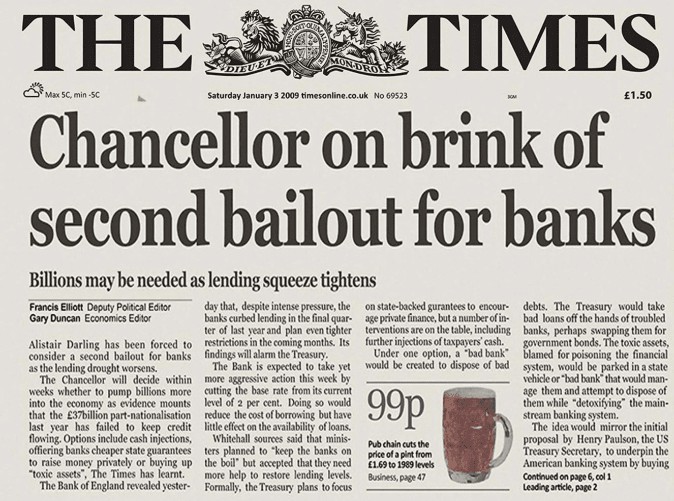
Bitcoin’s early memes were heavily influenced by these themes. Bitcoin is about abolishing banks, which is a good thing because banks are unsustainable monoliths that constantly create financial crises. Bitcoin exists to abolish fiat currency, because the banking system cannot exist without the underlying central banks and the fiat currency they issue—plus, fiat currency makes it possible to print money to fund wars. But in the fifteen years since then, the broader public discourse as a whole appears to have largely moved beyond concerns about money and banks. What is considered important now? Well, we can ask about a copy of Mixtral 8x7b running on my new GPU laptop:
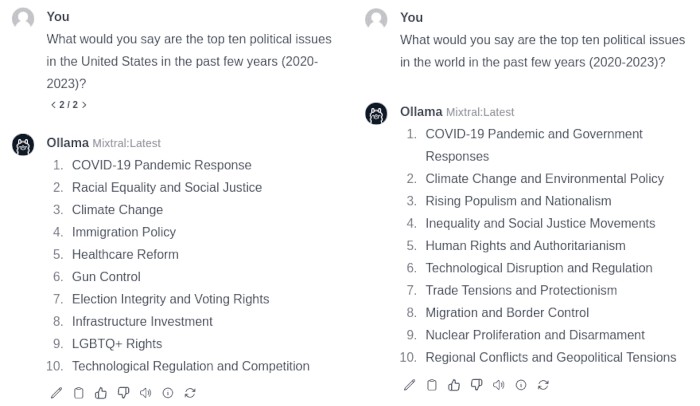
Once again, AI can make resonances legible
There is no mention of currency and bank or government control of currency. Trade and inequality are listed as issues of global concern, but as far as I can tell, the problems and solutions being discussed occur more in the physical world than the digital world. Is the original “story” of cryptocurrency increasingly behind the times?
There are two sensible responses to this conundrum, and I believe our ecosystem will benefit from both:
A reminder that money and finance still matter, and serving the world’s underserved in this niche
Looking beyond finance to use our technology to build a more comprehensive vision of an alternative tech stack that is freer, more open and democratic, and how to build a better society more broadly, or at least help those who have been excluded Tools for people outside mainstream digital infrastructure.
It's important to note that I think the crypto space is uniquely positioned to provide value there. Cryptocurrency is one of the few tech industries that is truly highly decentralized, with developers spread across the globe:
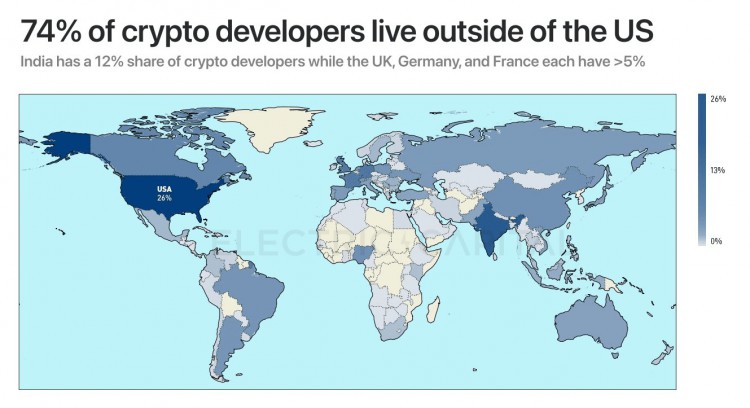
Source: Electric Capital’s 2023 Cryptocurrency Developer Report
Having visited many new global cryptocurrency hubs over the past year, I can confirm that this is indeed the case. Increasingly, large crypto projects are headquartered all over the world, or nowhere else. Additionally, non-Western developers often have a unique advantage in understanding the specific needs of crypto users in low-income countries and being able to create products that meet those needs. When I talk to a lot of people from San Francisco, I get the distinct impression that they think AI is the only thing that matters, that San Francisco is the capital of AI, so San Francisco is the only place that matters. "So, Vitalik, why haven't you settled down in the Gulf with your O1 visa yet"? Cryptocurrencies don’t need to play this game: it’s a big world and it only takes a visit to Argentina, Turkey or Zambia to remind yourself that many people still have important issues related to access to money and funding, and that there are still opportunities to balance Complex work on user experience and decentralization to truly solve these problems in a sustainable way.
Another vision is the one I outlined in my recent post, “Making Ethereum Cypherpunk Again.” Rather than just focusing on money, or becoming the “Internet of Value,” I think the Ethereum community should broaden its horizons. We should create a complete decentralized technology stack - one that is independent of the traditional Silicon Valley technology stack to the same extent as e.g. China's tech stack is - and competes with centralized tech companies at every level.
Let’s repost this technology stack comparison table again:
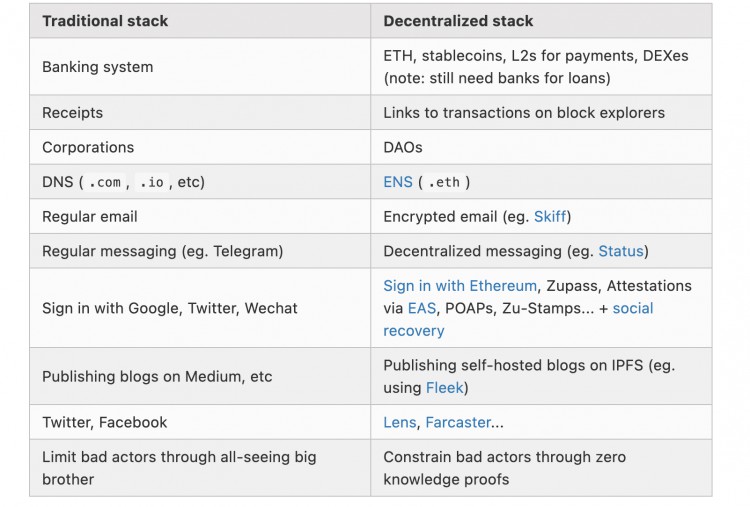
After I published that article, some readers reminded me that an important missing piece of the system is the technology of democratic governance: the tools through which people collectively make decisions. This is what centralized technology is really trying to provide, since each company is assumed to be run by a CEO, with oversight provided by...well...a board of directors. Ethereum has benefited from very primitive democratic governance techniques in the past, when a series of controversial decisions, such as the DAO fork and several rounds of issuance reductions, were made in 2016-2017, according to a team from Shanghai. Created a platform called Carbonvote where ETH holders can vote on decisions.
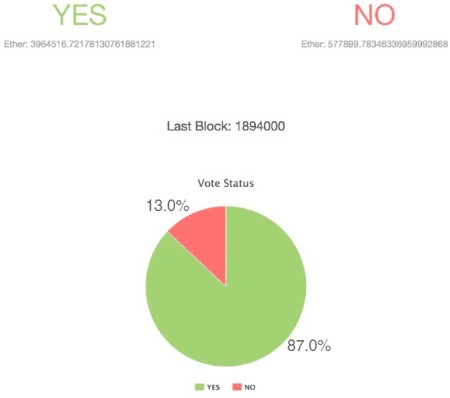
ETH votes on DAO fork
The vote is advisory in nature: there is no hard and fast agreement that the outcome will determine what happens. However, they help core developers have the confidence to actually implement a range of EIPs, knowing that the wider community will support them. Today, we have access to much richer proof of community membership than token holdings: POAP, Gitcoin Passport points, Zu stamps, and more.
Taken together, we can begin to see a second vision of how the crypto space can evolve to better meet the concerns and needs of the 21st century: creating a more comprehensive, trustworthy, democratic, and decentralized technology stack. Zero-knowledge proofs are key to expanding what this stack can offer: we can move beyond the false binary of “anonymous and therefore untrusted” versus “verified and KYC’d” and prove everything about who we are and what we have A more fine-grained statement of which permissions are available. This allows us to simultaneously address concerns about authenticity and manipulation – protecting against “Big Brother outside” – as well as concerns about privacy – protecting against “Big Brother within”. In this way, cryptocurrency becomes more than just a financial story and can be part of a broader story of creating better technology.
4
But how do we achieve this, beyond telling stories? Here we return to some of the issues I raised in my post three years ago: the changing nature of motivation. Often, those who focus too much on a theory of financial motivation – or at least a theory of motivation in which financial motivation can be understood and analyzed, while everything else is treated as a mystery we call “culture” Black Box – Be confused by this space because many actions seem contrary to financial motivations. “Users don’t care about decentralization”, but projects still often strive to be decentralized. “Consensus is built on game theory” However, successful social campaigns that drive people out of dominant mining or staking pools work in Bitcoin and Ethereum.
I rec
